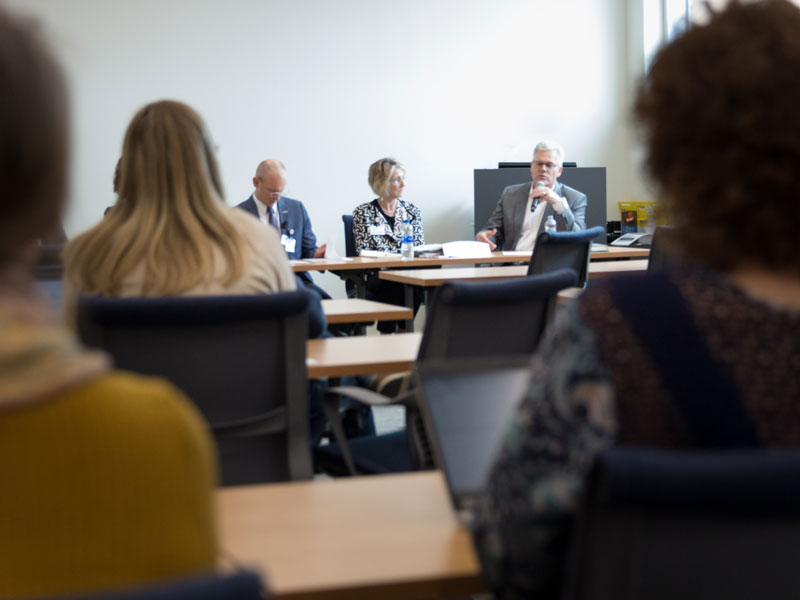U.S. government officials have issued new long-term care guidelines for battling coronavirus (COVID-19).

These guidelines, prioritizing infection control, inspection expectations and potential supply chain issues, are in response to the first confirmed coronavirus deaths in the United States. At one nursing home outside Seattle, nine people have died and others have gotten sick from the novel coronavirus, according to the Centers for Disease Control and Prevention.
Randy Bury, president of the Evangelical Lutheran Good Samaritan Society, led a town hall meeting with leaders from Sanford Health and the Good Samaritan Society one day after he met with Vice President Mike Pence and long-term care industry leaders from around the nation to discuss updating protocol.
Keeping medical supplies on hand
According to Bury, the outbreak of COVID-19 isn’t currently widespread enough to create shortages for medical supplies, such as face masks and gowns. However, if a widespread outbreak occurs, long-term health care providers could face challenges in keeping up with demand.
This would make it harder to control infections, especially around vulnerable individuals, like seniors.
“We have what we need today, but I think what we’re identifying in the supply chain, people will tell you because of what’s going on in China, the supply chain links are weaker in the supply chain than they have been in terms of masks and gown availability.
“We have enough today and we’ll have enough going forward, unless a widespread outbreak occurs. Then we’re going to run out of supplies, dwindle supplies pretty rapidly. That’s when we would need some help, I think, from the federal government to help distribute supplies to the areas of need,” said Bury.
Infection control in senior care
Bury says that inspections and surveys happen “all the time” at every kind of facility.
“I bet on any given day, we probably have a survey team at one of our facilities somewhere. They’re looking at all kinds of things, like life safety issues, infection control, clinical practices,” said Bury.
Out of all those criteria for inspections, maintaining the requirements for infection control is currently the most important, according to Bury.
“The message now in this new guidance is all those other things are important, but right now the focus is going to be on infection control. So, really make sure you’ve got that part of the requirements nailed.”
“Make sure you’re doing a great job in that area because the surveyors are going to be mostly looking at that,” said Bury.
What workers and residents can do
Government inspectors will be surveying areas of the nation and hospitals where the virus is prevalent.
When it comes to day-to-day practices, employee, and resident, hygiene is critical to limiting the spread of the disease, according to Bury.
He says for both residents and workers, proper hand-washing techniques and general common sense, like staying home if you feel sick, is key.
“One thing I think people need to know is this: This is not rocket science in any way. This is hand hygiene. If you’re feeling sick, stay home. It’s pretty basic stuff. I suppose that’s the good news. I mean, prevention on the spread of the virus should be within our capability to control to some extent as we do practice those basics,” said Bury.
What visitors can do
If visitors are experiencing symptoms of any respiratory illness, not just COVID-19, they should not visit family or friends in any kind of health care facility.
“Don’t come in the first place. But, if you do come, don’t be offended or mad or upset if a health care worker says, ‘I’m sorry, I don’t think you should visit today.’ I mean, because that will be a role and responsibility of our staff, too,” said Bury.
Practices in action at Sanford Health
The Good Samaritan Society has over 270 locations across the country, and over 9,000 residents, according to Bury.
With a reach that far, putting these basic, but critical practices in action is crucial in prevention.
Thursday afternoon, he led a company-wide video call with representatives from all of their locations to talk about those basics.
“It’s like an athlete practicing, right? It’s basic stuff, but you still practice the basic stuff,” he said. “We’re lifting up the importance of doing the basics of hand hygiene, personal hygiene in all our facilities and just constantly emphasizing that.”
Learn more
- What is the novel coronavirus (COVID-19)?
- Coronavirus: Sanford Health prepares for new strain
- What you need to know about the COVID-19 vaccine for kids 5+
…
Posted In COVID-19, News, Senior Services

